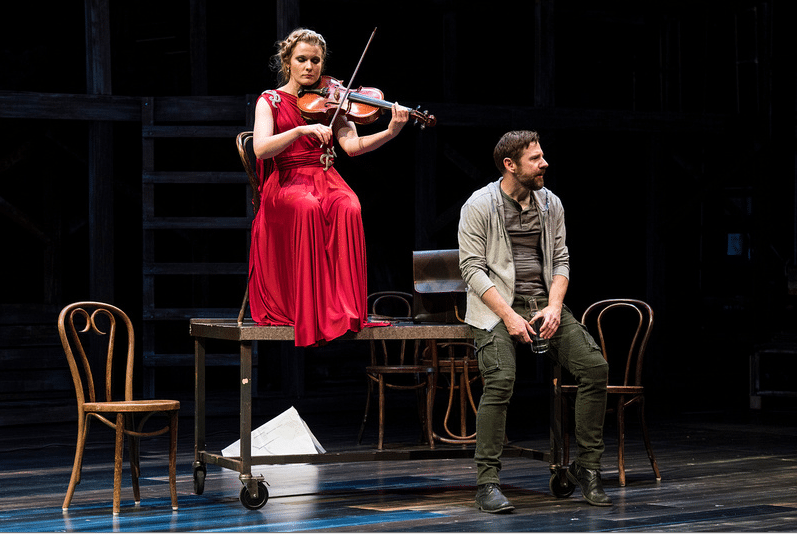CEDAR CITY — As one of the fundamental stories of Western literature, The Iliad has entranced audiences for centuries. In a reimagined adaptation entitled An Iliad, the Utah Shakespeare Festival has revived this story and made it relevant to contemporary audiences.

The slight title change—from The Iliad to An Iliad—is deliberate and marks the show as one version of The Iliad, and not a slavish recitation of Homer’s poem. In An Iliad, a single character, named only The Poet, retells the story. However, he adds asides and commentary that makes the epic poem understandable and relevant for a 21st century audience. The script be Lisa Peterson and Denis O’Hare (adapted from a translation by Robert Fagles) is therefore an amalgamation of the original Iliad and a commentary on its themes of patriotism, war, personal sacrifice, and family.
Brian Vaughn plays The Poet as a tired and weary storyteller who has a deep affection for the characters in his tale. The intensity of his description of the combat scenes is electrifying. Vaughn also frequently slips into impersonating some of the characters in the story, with his brief portrayals of Paris, Patroclus, and Achilles being the most interesting because of the way he activated the imagination and showed the audience why these characters made the choices they did. Where Vaughn excels, though, is in the modern commentary, which humanized these distant heroes and their actions. For example, when The Poet explained the changes that soldiers encounter when returning home after a long campaign, he showed that the jarring changes and required adjustments are the same for modern soldiers as they were for the ancient Greeks. Another moment that rang true through the ages was how The Poet described how the impact sight of corpses on the battlefield is the same in any war throughout human history.

Vaughn’s only partner on stage is Katie Fay Francis as The Muse, whose main job it is to provide musical underscoring and to add to the majestic mood of the play. Whereas The Poet is an earthy and fatigued character, The Muse is an ethereal, otherwordly presence through Francis’s quiet dignity and soft beauty. Her haunting feminine singing voice contrasted well with the masculinity of the story of warfare and death.
The visual world of the play is as spartan as an ancient military encampment. An Iliad is performed on the same set as the Festival’s current production of Othello, with additional props and furniture by “scenery coordinator” Nils Emerson. Each actor wears only a single costume (designed by Jeffrey Lieder), with Vaughn dressed in modern muted colors and Francis in a flowing dress that makes her visually stand out from the neutral colors of the stage and furniture. The most daring visual element is the lighting (designed by William C. Kirkham), which not only follows the emotional timbre of The Poet’s language, but also bathed the audience in light throughout the entire play, which forced the audience to be part of the story.
Director Jason Spelbring has helped Vaughn create a variability in his performance that prevented the play from growing monotonous. He has created clever uses of the ghostlight that put Vaughn in athletic poses that were reminiscent of ancient Greek statues. I also appreciated the hypnotic entrance for The Muse that Spelbring engineered.
Entering the theater, I was skeptical about the prospect of adapting The Iliad to the stage. Where the playwrights, director, and actors have succeeded is in bringing The Iliad back to its roots: as an oral story told by a single traveling bard. Adding the modern language and digressions only benefits the tale and makes it worthy of a modern audience’s attention.
[box]The Utah Shakespeare Festival production of An Iliad plays various dates at 2 PM or 8 PM through October 9 in the Ames Studio Theatre on the campus of Southern Utah University. Tickets are $50-54. For more information, visitwww.bard.org.[/box]
